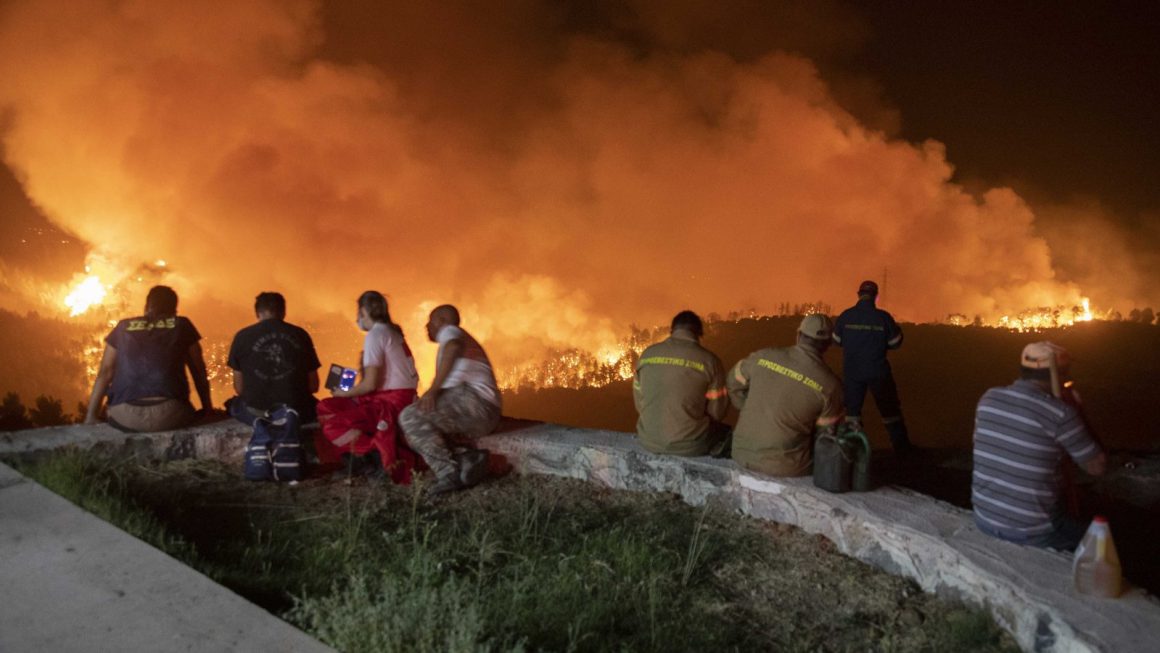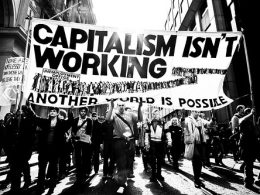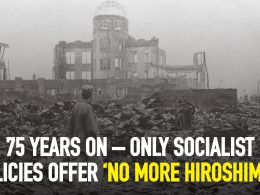By Chris Stewart and Keishia Taylor
In recent years millions of young and working class people have engaged in protests against the climate and ecological crisis as devastating wildfires, heat waves, droughts, hurricanes and floods have increased in regularity and intensity around the world. “System change, not climate change!” has become the main slogan, reflecting a sense that we need a fundamental transformation of society to avoid catastrophe.
It is no surprise that this has emerged alongside a renewed interest in the ideas of Karl Marx and Friedrich Engels, and their critique of capitalism. They argued that capitalism was based on exploitation, both of workers and of nature, and that it would inevitably provoke environmental crises. In particular, Marx’s theory that capitalism created a “metabolic rift” between human society and nature has re-emerged as an indispensable tool for understanding the crisis we face today.
Metabolism and natural cycles
As a materialist, Marx’s starting point was that human society, having evolved from nature itself, was deeply connected to the natural conditions in which we live. “Man lives from nature”, Marx wrote in 1844, “and he must maintain a continuing dialogue with it if he is not to die.”(1)
Studying the cutting edge of natural science at the time, Marx and Engels recognised that human society was dependent on the dynamic and complex systems of nature, made up of delicately balanced natural cycles and circular processes that sustain all life on Earth. These natural cycles have emerged and stabilised over Earth’s geological history. Humanity, and human societies, has evolved through a “metabolic interaction” with these natural cycles and processes; deriving from them food, shelter, clothing, energy and heat and in turn having an effect on nature itself.(2)
These cycles are the foundation on which all human society, production and culture develops. The carbon cycle between the atmosphere and the oceans plays a key role in regulating the temperature of the Earth. The nutrient cycle replenishes the soils, allowing plant life to continue to grow from which we derive food and other useful things. The circulation of water through the atmosphere is crucial to ensure freshwater is recycled through the Earth, without which no life could exist.
These are just some of the natural processes that have been crucial to the Earth’s biogeochemistry during the Holocene, the most recent geological epoch in which all of human civilization has emerged. Recognising the importance of these natural processes, Marx argued that a sustainable relationship between humanity and nature was “prescribed by the natural laws of life itself”.(3)
Capitalist contradictions
With the emergence of the capitalist mode of production a few hundred years ago, the way human society interacts with the natural world changed fundamentally. Even in the mid-19th century, Marx and Engels were able to see the growing contradiction between capitalism and nature.
The emergence of industrial capitalism was associated with revolutionary scientific and technological developments that massively increased human productivity. Marx and Engels recognised this system as historically progressive in relation to the feudal system that had come before it. At the same time, however, they identified a number of contradictions at the heart of the system that meant it would quickly become a block on further development – creating social, economic and environmental crises.
Capitalism is based on the private ownership of the wealth and resources of the planet by a small number of corporations and super-wealthy individuals. While capitalism has created a global division of labour, bringing together the combined efforts and skills of workers all across the world, these workers have no control over how things are produced. Instead, capitalists direct production based solely on the maximisation of profits.
Profit is made by exploiting the labour power of workers (paying them less than the value they produce) and extracting resources from nature. Under this system nature is treated as a “free gift”(4) to business that has no value in its own right until it is turned into raw materials for production.
Because capitalists are locked in competition with one another on the market they are compelled to expand, disrupt, extract and exploit, endlessly commodifying every aspect of our lives. The environment is not viewed as having inherent natural boundaries and limits within which humans must live, but as an inexhaustible source of profits, and the system’s growth requires a constantly rising stream of raw materials and fossil fuels.
The intensity of competition means that companies have to function on short-term profit cycles. Companies that cannot keep the profit taps flowing will be beaten out by competitors and go bust. This means the system is inherently short-sighted, not able to see past the immediate drive to increase profits.
But this short-sighted drive for profits comes into conflict with the ability of nature to replenish itself. Engels argued that capitalists tended to ignore or externalise the environmental impact of production, treating the environment as an endless source of materials to be depleted and a waste ground to be polluted.
He was clear that this would inevitably provoke environmental crises as the pursuit of profit sets off chain-reactions in nature, undermining the natural source of wealth: “let us not, however, flatter ourselves overmuch on account of our human conquest over nature. For each such conquest nature takes its revenge on us.”(5)
The metabolic rift
In recent years there has been renewed interest in Marx’s writings on capitalist agriculture, in which he explained that capitalism’s constant drive to accumulate profits was disrupting the life-sustaining cycles of nature. This was creating a “rift” in the metabolism between human society and the natural world which, he argued, threatened the very basis of human society.
He came to this conclusion through the work of German chemist Justus Von Liebig, who warned that industrial agriculture in Europe was disrupting the Earth’s nutrient cycle as nutrients in food were transported from the countryside to the cities and later washed into the sea as pollution, resulting in the depletion of the soil and a build-up of waste, and an explosion of disease in urban areas(6). The overuse of chemical fertiliser to compensate for this was destroying “the lasting source of fertility” in the soil, i.e. its organic complexity.
Modern agribusiness and its commodification of food has replicated on a global scale the kind of metabolic disruption that Marx observed in the 19th century. In the neocolonial world, capitalist agriculture has been one of the key drivers of deforestation and land-use change, creating vast landscapes of monocultures such as palm oil plantations or giant cattle farms for companies like McDonalds. This is triggering extreme drought through impacts on the water-cycle, especially in the Amazon where agricultural deforestation is also threatening to release a vast store of ancient sequestered carbon, exacerbating climate change.(7)
The era of capitalist globalisation forced many countries to prioritise growing cash crops such as coffee or cotton for export on the world market, even where the climate is ill-suited to their growth. This has destroyed self-sufficiency, led to increased food insecurity, and has been a key driver of soil degradation.
Major advances in crop breeding technologies in the 50s and 60s raised wheat yields by two-thirds and rice yields by about one-third in the space of ten years, but did so on the basis of a massive expansion of fertiliser and pesticide use. This effort was led by US agribusiness multinationals as they sought to create spiralling dependencies on their products. Intensively promoted in India, Mexico and other neo-colonial countries, these methods have led to a collapse in natural fertility, creating a total dependency on huge quantities of synthetic fertilisers. Now, disruptions in the supply chain of such fertilisers is contributing to a global food crisis.
Synthetic fertilisers are not only harmful, but also limited as a resource. The Earth’s store of phosphorus – nearly 90% of which is used in the global food supply chain, most of it in crop fertilisers – is being depleted at an alarming rate. At current consumption levels it is estimated we will run out of known phosphorus reserves in around 80 years(8). Capitalism has merely kicked the problem of soil exhaustion down the road, deepening the crisis at every stage.
The same global processes have driven small and medium farmers all over the world into debt, due to rising costs of fertilisers and pesticides. This has forced many out of business and pushed them into ever-expanding city slums – a major factor behind the huge protests of farmers in India in recent years.
As Marx said: “all progress in capitalist agriculture is a progress in the art, not only of robbing the worker, but of robbing the soil.”(9)
Control of the world’s food is becoming increasingly concentrated into the hands of a small number of multinationals. For example, four corporations control around 90% of the global grain trade, and just ten companies control every large food and beverage brand in the world. The food sector is also becoming tightly coupled to the financial sector. This is making it more susceptible to cascading failure, which would have absolutely catastrophic effects for human life worldwide.(10)
Under this system food is not produced primarily to be nourishing, but to turn a profit. This means that millions of people go hungry despite the productive forces existing to comfortably feed everyone. For example, today 828 million people are malnourished and 44 states experience “alarming” levels of hunger, but at the same time wheat is piling up in US and Russian grain silos as speculators are unable to make money amid volatile markets.(11)
Factory farming of animals is also massively wasteful of resources, including grain and water, and produces 18% of total greenhouse gas emissions.(12) The commodification of animals requires the most brutal conditions aimed at increasing efficiency. Animals are raised in tightly-packed barns in cruel and barbaric conditions. They are selectively bred for the most profitable traits, producing almost genetically identical animals that are dosed full of growth hormones so they reach maturity as quickly as possible to increase turnover. All of this means factory farms are also huge reservoirs for viruses that can develop and spillover to humans – a particularly gruesome metabolic rift that capitalism has created.(13)
The planetary rift
While Marx’s writings on the metabolic rift related to the question of agriculture and soil depletion, the period since his death has seen the rift between human production and the natural processes on which it is based widen immeasurably.
Capitalism is destroying the earth’s ecosystems. Minerals, nutrients and other raw materials have been vacuumed up from nature while pollution has been vomited back out into the ground, sea, and air. In recent decades as capitalism has expanded into every corner of the globe it has turned 50% of the earth’s land into agriculture, cities, roads, and other infrastructure, driving land-use change that accounts for 14% of all greenhouse gas emissions.(14)
This has driven a collapse in the planet’s biodiversity. Capitalism has wiped out almost 70% of mammal, bird, amphibian, fish, and reptile populations since 1970 and half of all insect populations are disappearing (leading to a decline in pollinators and, in turn, food production).(15) Biodiversity is dialectically linked to the conditions of the climate – a stable climate has created the conditions for life to develop and diversify, but the diversity of life has also stabilised the earth system. Without it, the life-sustaining natural processes of the planet will be thrown into crisis.
This is just one of many epoch-making changes that capitalism has wrought on the planet. Climate scientists refer to the period since the 1950s as the “Great Acceleration” which has seen exponential “hockey stick” (named due to their shape on graphs) increases in: fossil fuel combustion, CO2 emissions, ocean acidification, species extinctions (and losses in biodiversity more generally), nitrogen and phosphorus cycle disruptions, freshwater depletion, forest loss, and chemical pollution. Because of this, it is argued that we have left the “Holocene” and entered the “Anthropocene” – a new geological epoch in which the Earth’s natural systems are dominated by human impacts.(16)
Scientists now warn that at least five of the nine “planetary boundaries” have likely been crossed already. These are global environmental conditions that act as a “safe operating space for humanity”. When they are crossed a “tipping point” is reached, triggering a cascade of climate chaos which could bring systematic environmental collapse (the kind of collapse that occurred during the Earth’s historical mass extinction events). The crossing of these boundaries may signal “points of no return” in which the Earth’s systems will be irreparably changed, throwing them into crisis until they find some new equilibrium undoubtedly less suited to human survival.(17)
A system in decay
According to an assessment by the IPCC, 3.6 billion people are highly vulnerable to the impacts of climate change (especially extreme heat, heavy rainfall, drought and wildfires) in the immediate future.(18) At the same time, the capitalist system – increasingly desperate for profits – is only accelerating its destruction of the environment.
Today, all of the contradictions of the system are growing and, increasingly, the crises it creates are interacting with one another; war, economic crisis, climate breakdown, famine, mass displacement and so on. All of these crises stem from the fact that the private ownership of wealth, resources and industry, and the constant accumulation of profit by the capitalist class, are coming into conflict with the needs of humanity and the planet.
Let’s take the energy industry as an example. Despite their nauseating greenwashing the big banks have poured some $4.6 trillion into the fossil fuel industry since 2015(19) and oil and gas companies plan to spend some $4.9 trillion in exploration and extraction in new fields by 2030.(20) This is because fossil fuels – on which an entire global infrastructure is built – provide far greater short-term profits than undergoing years-long productive investment in renewables would.
The IPCC says that by 2050 80% of the world’s energy supply could come from renewable sources. This would be necessary to keep greenhouse gas concentrations to less than 450 parts per million, the level scientists estimate is the limit of safety beyond which climate change becomes catastrophic and irreversible.(21) But achieving this is an impossibility for the market. Undergoing this kind of transition would mean investors writing off around $20 trillion worth of untapped fossil fuel assets already being traded on the market and held as “futures” by corporations – highly profitable from the point of view of the market, but apocalyptic for the planet if they were ever to be realised.(22)
Socialist transformation of society
The capitalist market is totally incapable of dealing with the ecological crisis that it has created. On the basis of private ownership of the wealth, resources and industries of society, a planned transition to sustainable production is impossible. Short-sighted profiteering will only make the crisis worse as it unfolds, as was seen with the Covid crisis and countless extreme weather events.(23)
Facing the crisis of the Anthropocene requires nothing short of revolutionary change, wherein society’s economic and natural resources are taken out of the hands of the big banks and corporations and into democratic public ownership. Only then could we – the working-class majority – collectively plan economic production and distribution to meet human needs within the limits of the “planetary boundaries”, turning the huge productive power of humanity towards healing the metabolic rift produced by capitalism.
This would start with massive investment in green energy, public transport, sustainable cities and urban planning, low-carbon jobs, restoration projects and climate resilient infrastructure while also reducing the huge amounts of waste inherent to capitalism. All of this would massively improve human welfare while reducing environmental damage.
In a planned economy, free from the grip of massive corporations and financial speculators, we could feed more people more efficiently using sustainable farming techniques and technologies; matching crops with local climates and ecosystems, using fewer resources, providing quality jobs and eliminating waste.
The only force that can achieve this is the global working class, which is highly organised and connected through global supply chains today. United, and fighting in its own interests for a socialist programme, the workers of the world have the power to fundamentally transform society, eliminating poverty, waste and wanton destruction, thus bringing about what Marx called the “genuine resolution of the conflict between man and nature, and between man and man”.(24)
- Karl Marx, Economic and Philosophical Manuscripts, www.marxists.org
- Karl Marx, Capital Volume 1, www.marxists.org
- Karl Marx, Capital Volume 3, www.marxists.org
- Ibid.
- Friedrich Engels, Dialectics of Nature, www.marxists.org
- John Bellamy Foster, 3 July 1998, ‘Liebig, Marx and the Depletion of the Natural Fertility of the Soil’, www.monthlyreviewarchives.org
- Claire Asher, 5 Apr 2021, The nine boundaries humanity must respect to keep the planet habitable, www.ncronline.org
- MIT, Fighting Peak Phosphorus, web.mit.edu
- Karl Marx, Capital Volume 1
- George Monbiot, The banks collapsed in 2008 – and our food system is about to do the same, The Guardian
- Dan O’Rourke, 19 October, ‘Global food crisis: How imperialism is the cause’, www.socialistparty.ie
- FAO, Tackling climate change through livestock, www.fao.org
- Rob Wallace, 2016, Big Farms Make Big Flu, Monthly Review Press
- J. Brannberg and Bl. Serrano, ‘How bad is It? The acute threat from climate crisis’, www.socialistparty.ie
- WWF, Living planet report 2022
- Foster, Holleman and Clark, 1 Jul 2019, Imperialism in the Anthropocene, www.monthlyreview.org
- Stockholm Resilience Centre, The nine planetary boundaries
- Adam Vaughn, 28 Feb 2022, Climate change causing widespread and irreversible impacts, says IPCC, New Scientist, www.newscientist.com
- Banking on the climate chaos: Fossil fuel finance report 2022, www.bankingonclimatechaos.org
- Global Witness, Entire $4.9 trillion investment in new oil and gas is incompatible with global climate goals
- IPCC, Renewables could provide 80% of global energy by 2050
- John Fullerton, The Big Choice, www.capitalinstitute.org
- Ryan Booker, 28 Feb 2021, Texas: Workers Freeze Due to Billionaire Greed, www.socialistparty.ie
- Karl Marx, Private Property and Communism, www.marxists.org












